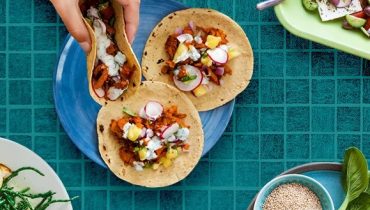About everyone has a response to the “what’s your favourite food?” query.
People are naturally driven to enjoy food, hence this is understandable. For many, indeed, eating is among the biggest joys in life!
Apart from making mealtimes fun, enjoying eating has major advantages for health. Savouring food supports digestion, can help improve your connection with food, can assist overcome disordered eating and more.
Sometimes the contents of your meal is not as crucial as obtaining enough “vitamin P,” sometimes known as probably vitamin mmmm. Read on to explore the delicious pleasures of why enjoyment counts for eating.
The psychology behind eating for pleasure
Researchers have investigated the science underlying eating for enjoyment for years. Their results are fascinating and generally hopeful.
Physiologically, the pleasure humans get from food comes from our brains as much as from our mouths.
Therapist, nutritionist, and Certified Body Trust practitioner Aleta Storch, RDN, of Wise Heart Nutrition and Wellness says, “Pleasure of any kind, including pleasure from food, leads to a release of dopamine in the brain.”
She notes that “dopamine is often referred to as the “feel good hormone” since it activates the reward pathways in the brain, so helping to promote happiness, calmness, motivation, and focus.”
Some older 2011 studiesTrusted Source really show that obese individuals may have altered dopamine sensitivity, which would cause them to oveeat in order to get enough pleasure from food.
But when brain chemistry is functioning as it should, our enjoyment of food may have physical advantages.
“We actually digest and metabolise the food we are eating more effectively when we enjoy it and boost dopamine,” notes Storch. “When we’re relaxed in response to having a pleasurable eating experience, our nervous system goes into rest and digest mode, which lets us totally break down and use the nutrients from the foods we eat.”

Get Your Vitamin P: Why Pleasure Matters When It Comes to What You Eat
Furthermore encouraging better eating could be eating for enjoyment.
Examining 119 studies on the relationship between food enjoyment and a healthy diet, a major systematic review from 2020Trusted Source Of the research, fifty-seven percent revealed positive links between dietary results and enjoyment of food.
One 2015 research paperFor example, Trusted Source connected better eating enjoyment with better nutritional status. other researchTrusted sources have underlined the need of enjoying nutritious, balanced meals by means of enjoyment from good cuisine.
“There’s this belief that ‘healthy’ food has to be bland or it doesn’t taste good, but that’s just not true,” explains dietitian and certified intuitive eating counsellor Sarah Gold Anzlovar, MS, RDN, LDN. “When we eat food we enjoy, satisfaction rises; this can actually improve diet quality and lower the likelihood of binge episodes or overindulgence.”
The emotional nourishment of the foods we eat
If food were only fuel, mealtimes would be fairly dull. From bringing us together with loved ones to tying us to our cultural background, eating covers a broad spectrum of the human experience.
Food is, fundamentally, emotional as well as physical nourishment. These are some ways that eating may nourish your spirit.
Pleasure of food strengthens social interaction.
Without something to eat, what is a party or family get-together?
A 2015 study on Thai social networks found that as people enjoy meals with others, it usually leads to more happiness.
Enjoyment of food provides mental and bodily solace.
Foods like these have a way of elevating our moods and calming our bodies; warm chicken soup when you’re sick, pasta that reminds you of your grandma, or the beloved dessert that always seems to hit the mark.
“Sometimes food even offers comfort at the end of a demanding day, which many people associate as negative emotional eating,” notes Anzlovar. “But there are many advantages when we let ourselves to interact with the food and enjoy it.”
Enjoyment of food releases the grip of diet culture.
Though diet culture has several meanings, one feature of this society-level messaging is that you have to say no to things you enjoy, especially if they are heavy in calories or fat.
Choosing to deliberately savour your food enables you to reject this negative mindset.
“When all foods are allowed without rules—including the most delicious ones—the body learns to trust that it will get what it needs,” notes Storch.”Creating permission for these foods that have been labelled as ‘bad’ or ‘off-limits’ is an important step in the healing process, and can help someone to feel more peace, confidence, and freedom around food.”
Enjoyment of food ties us to our cultural background.
For decades, studiesTrusted Source have shown that mental health depends critically on a feeling of belonging. Inside your family or cultural background is not as lovely location to experience belonging as elsewhere.
Here is where love of food could be quite important.
Storch states, “Culture and tradition help us to connect with each other and with ourselves.” Denying or restricting meals that foster connection can cause disengagement and loneliness. Eliminating cultural foods tells not only that the food is “bad,” but also that the underlying identity connected with it is “bad.”
Accepting these foods could finally lead to a sense of freedom and belonging that improves your mental health.
Eating for pleasure vs. emotional eating
Turning to food to handle challenging emotions like stress, anger, or sadness usually leads to mindless eating and a damaged relationship with food. Still, it makes sense if you find the concept of eating for enjoyment unsettling.
Fortunately, the goal and results of emotional eating and eating for pleasure differ as well.
“Emotional eating is when people use food as a way to cope with both positive or negative emotions,” Anzlovar notes. Eating for pleasure is selecting a food to especially enjoy its taste, texture, and experience, such as when you go out for an ice cream cone in the summer or eat an apple directly from the tree in an apple orchard.
One further big difference between these two actions is your attitude towards your meal.
“Often, though not always, people emotionally eat and lack connection or disassociation with the food,” Anzlovar notes. ” Usually, the food you are eating for delight has a real connection and enjoyment.”
Of all, there is no exactly defined boundary separating emotional eating from eating for pleasure—and occasionally the two may cross.
How do you feel afterwards to indicate which you are practicing?
Making a point to deliberately appreciate your food won’t cause guilt or shame.






